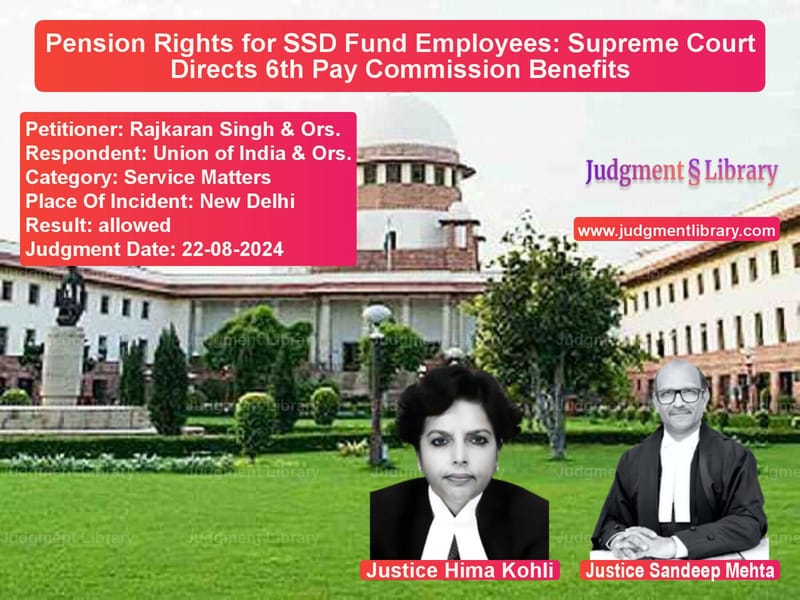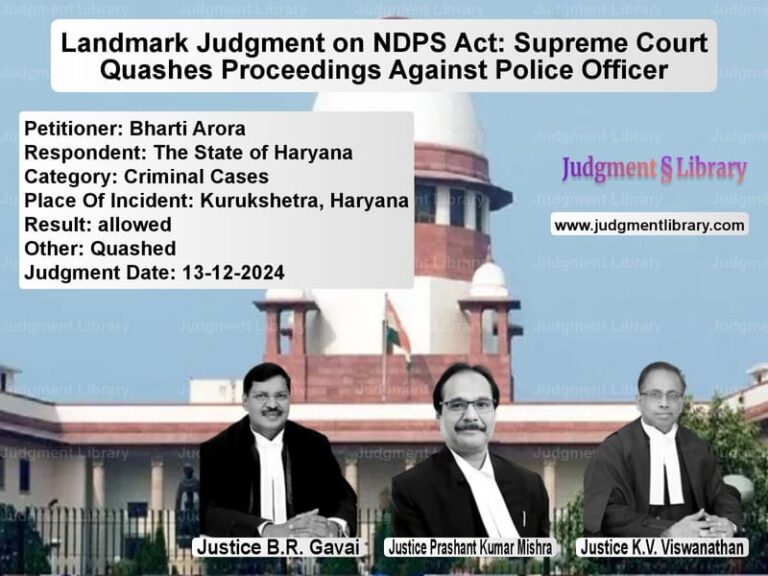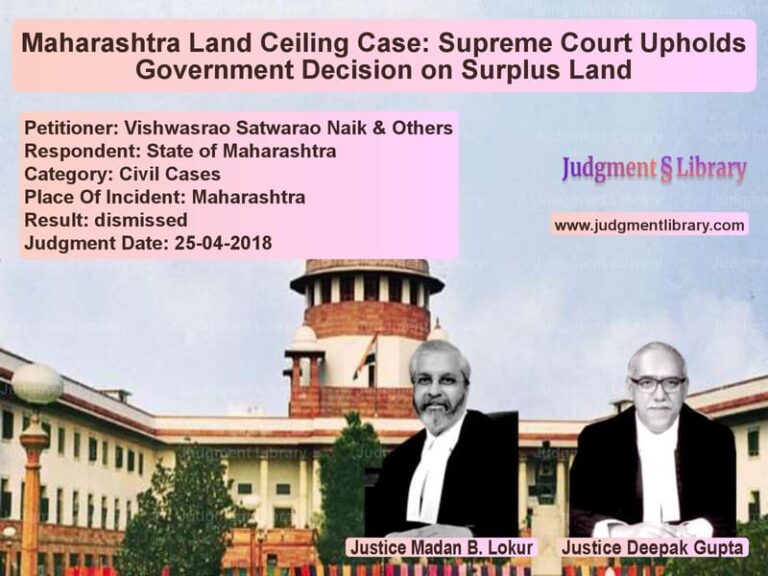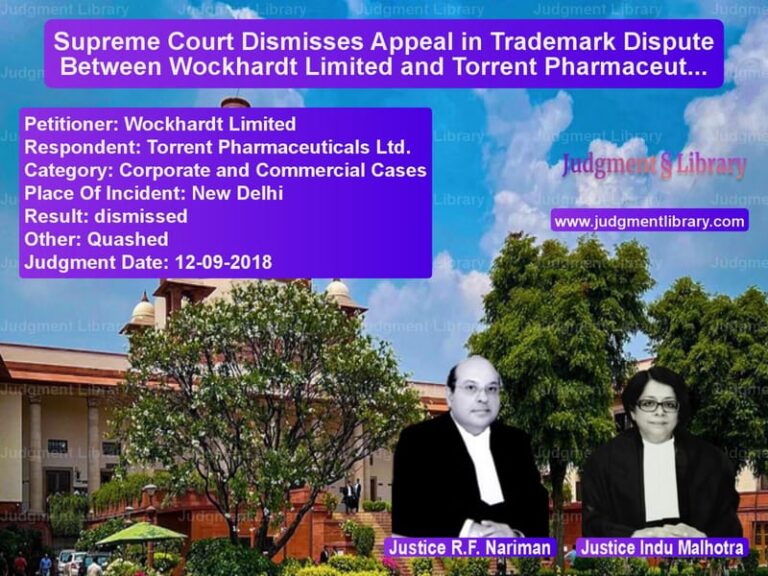Pension Rights for SSD Fund Employees: Supreme Court Directs 6th Pay Commission Benefits
The Supreme Court recently delivered a landmark judgment in the case of Rajkaran Singh & Ors. vs. Union of India & Ors., addressing the long-standing dispute over pensionary benefits for employees managing the Special Frontier Force (SFF) Compulsory Saving Scheme Deposits (SSD) Fund. The ruling recognizes the petitioners’ rights under the 6th Central Pay Commission (CPC), granting them financial benefits and regularization after decades of service.
Background of the Case
The petitioners were employed in various administrative roles such as Junior Accountant, Accountant, Upper Division Clerk (UDC), and Lower Division Clerk (LDC) to manage the SSD Fund, a welfare initiative funded by voluntary contributions from SFF personnel. Despite serving for over three decades, they were denied benefits under the 6th CPC, receiving only an ad-hoc monthly amount of Rs. 3,000 instead.
The Central Administrative Tribunal (CAT) and the Delhi High Court had previously ruled against them, upholding the Union of India’s stance that SSD Fund employees were not government servants and thus ineligible for pensionary benefits.
Petitioners’ Arguments
The petitioners, represented by senior counsel, contended:
- They had worked for over 30 years in a structured government framework, receiving increments, promotions, and benefits akin to regular government employees.
- The SSD Fund, though funded by voluntary contributions, was managed under the administrative control of the SFF, making it a quasi-governmental body.
- They were recruited following a formal process and were integrated into the HQ SFF administrative system after April 1, 2003.
- Despite performing identical duties as regular government employees, they were arbitrarily denied pay scales under the 6th CPC.
- The denial of benefits violated Article 14 (Right to Equality) of the Constitution of India.
Respondents’ Arguments
The Union of India, opposing the claim, argued:
- The SSD Fund was a non-governmental welfare scheme, and employees working under it were not entitled to government pay scales.
- The employees were recruited without adherence to central government recruitment policies, making them ineligible for pensionary benefits.
- Since salaries were paid from the SSD Fund rather than the Consolidated Fund of India, the petitioners could not claim benefits reserved for regular government employees.
- The Tribunal and the High Court had rightly ruled against the petitioners, and no new facts warranted intervention by the Supreme Court.
Supreme Court’s Observations
After a detailed review, the Supreme Court made key observations:
- The petitioners had served in a government-like structure for over three decades, receiving similar benefits as SFF employees.
- Their work was integral to the financial administration of the SSD Fund, a task closely linked to government functions.
- The extension of the 4th and 5th CPC benefits to the SSD Fund employees created a legitimate expectation for them to be included in the 6th CPC framework.
- While the SSD Fund was self-financed, it was governed by military authorities, indicating deep government control.
- The distinction between SSD employees and regular SFF administrative staff was arbitrary and lacked justification.
Final Judgment
On August 22, 2024, the Supreme Court ruled in favor of the petitioners:
- The petitioners are entitled to benefits under the 6th CPC, including revised pay scales and pensionary benefits.
- The Union of India is directed to extend all applicable service benefits within six months.
- The High Court’s decision is set aside, and the appeal is allowed.
- The judgment applies only to existing SSD Fund employees and does not set a precedent for future recruitments.
Implications of the Judgment
This ruling has significant implications for government employment policies:
- Recognition of quasi-governmental employees: It affirms that employees working under government supervision cannot be arbitrarily excluded from service benefits.
- Extension of CPC benefits: It sets a precedent for employees who were previously denied pay commission benefits despite performing government functions.
- Strengthening equality in employment: The judgment reinforces the constitutional guarantee of equal pay for equal work.
Conclusion
The Supreme Court’s verdict in this case upholds the principle of fairness in public employment. By granting pensionary benefits and revised pay scales under the 6th CPC, the Court has ensured that long-serving SSD Fund employees receive their rightful dues, setting a benchmark for similar cases in the future.
Petitioner Name: Rajkaran Singh & Ors..Respondent Name: Union of India & Ors..Judgment By: Justice Hima Kohli, Justice Sandeep Mehta.Place Of Incident: New Delhi.Judgment Date: 22-08-2024.
Don’t miss out on the full details! Download the complete judgment in PDF format below and gain valuable insights instantly!
Download Judgment: rajkaran-singh-&-ors-vs-union-of-india-&-ors-supreme-court-of-india-judgment-dated-22-08-2024.pdf
Directly Download Judgment: Directly download this Judgment
See all petitions in Employment Disputes
See all petitions in Pension and Gratuity
See all petitions in Public Sector Employees
See all petitions in Recruitment Policies
See all petitions in Judgment by Hima Kohli
See all petitions in Judgment by Sandeep Mehta
See all petitions in allowed
See all petitions in supreme court of India judgments August 2024
See all petitions in 2024 judgments
See all posts in Service Matters Category
See all allowed petitions in Service Matters Category
See all Dismissed petitions in Service Matters Category
See all partially allowed petitions in Service Matters Category







